Advanced Needs Assessment: Alzheimer's Disease in the UK - MB4002
VerifiedAdded on 2022/08/08
|16
|2476
|24
Report
AI Summary
This report provides a comprehensive analysis of Alzheimer's disease in the UK, addressing its prevalence, causes, and impact on the population. The study begins by outlining the disease and its characteristics, emphasizing the role of genetics and brain function. It then details the study's aims, which include mapping the disease's spread, describing the needs of the UK population using epidemiological, quantitative, and qualitative data, and identifying effective interventions. The report delves into the causes of Alzheimer's, including age, family history, and lifestyle factors, followed by an epidemiological overview that highlights the increasing number of cases and associated costs. The report also examines interventions like cognitive therapy and reality orientation training, and proposes an action plan involving government campaigns, early diagnosis, and support for those affected. Finally, it underscores the need for early diagnosis, appropriate care, and ongoing research to mitigate the disease's impact.

Running Head: ALZHEIMER’S (DEMENTIA IN UK)
ALZHEIMER’S (DEMENTIA IN UK)
Name of the Student:
Name of the University:
Author Note:
ALZHEIMER’S (DEMENTIA IN UK)
Name of the Student:
Name of the University:
Author Note:
Paraphrase This Document
Need a fresh take? Get an instant paraphrase of this document with our AI Paraphraser
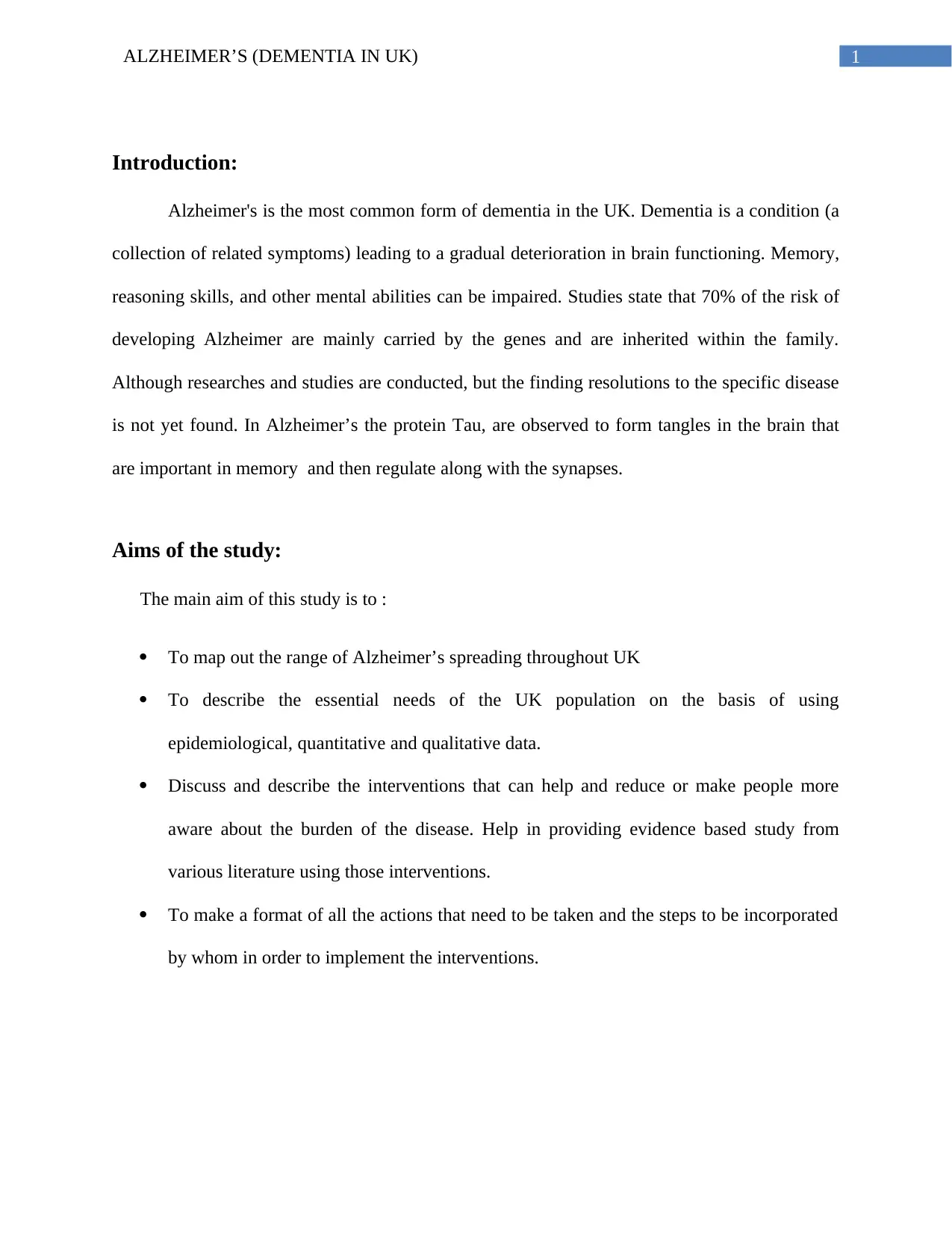
1ALZHEIMER’S (DEMENTIA IN UK)
Introduction:
Alzheimer's is the most common form of dementia in the UK. Dementia is a condition (a
collection of related symptoms) leading to a gradual deterioration in brain functioning. Memory,
reasoning skills, and other mental abilities can be impaired. Studies state that 70% of the risk of
developing Alzheimer are mainly carried by the genes and are inherited within the family.
Although researches and studies are conducted, but the finding resolutions to the specific disease
is not yet found. In Alzheimer’s the protein Tau, are observed to form tangles in the brain that
are important in memory and then regulate along with the synapses.
Aims of the study:
The main aim of this study is to :
To map out the range of Alzheimer’s spreading throughout UK
To describe the essential needs of the UK population on the basis of using
epidemiological, quantitative and qualitative data.
Discuss and describe the interventions that can help and reduce or make people more
aware about the burden of the disease. Help in providing evidence based study from
various literature using those interventions.
To make a format of all the actions that need to be taken and the steps to be incorporated
by whom in order to implement the interventions.
Introduction:
Alzheimer's is the most common form of dementia in the UK. Dementia is a condition (a
collection of related symptoms) leading to a gradual deterioration in brain functioning. Memory,
reasoning skills, and other mental abilities can be impaired. Studies state that 70% of the risk of
developing Alzheimer are mainly carried by the genes and are inherited within the family.
Although researches and studies are conducted, but the finding resolutions to the specific disease
is not yet found. In Alzheimer’s the protein Tau, are observed to form tangles in the brain that
are important in memory and then regulate along with the synapses.
Aims of the study:
The main aim of this study is to :
To map out the range of Alzheimer’s spreading throughout UK
To describe the essential needs of the UK population on the basis of using
epidemiological, quantitative and qualitative data.
Discuss and describe the interventions that can help and reduce or make people more
aware about the burden of the disease. Help in providing evidence based study from
various literature using those interventions.
To make a format of all the actions that need to be taken and the steps to be incorporated
by whom in order to implement the interventions.
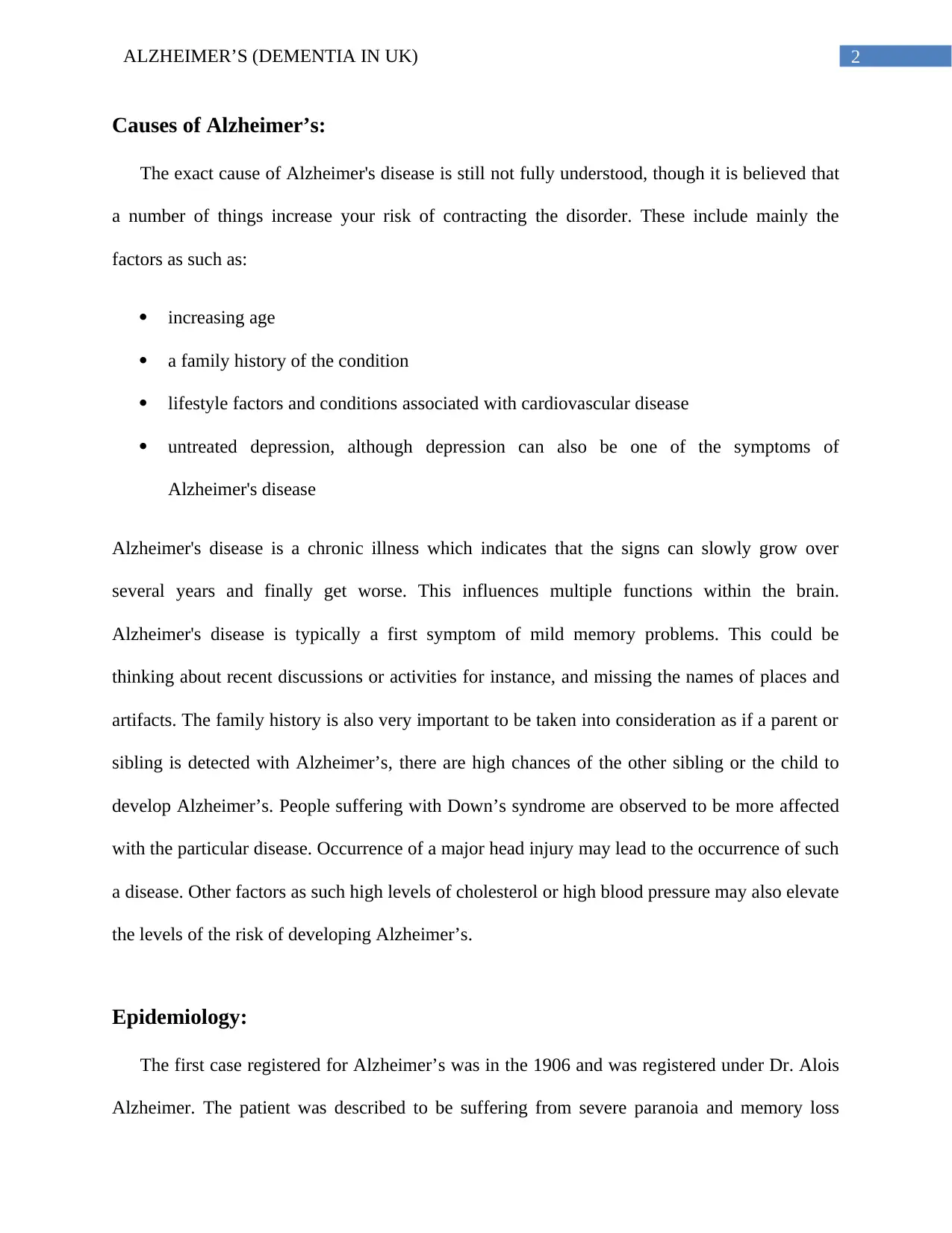
2ALZHEIMER’S (DEMENTIA IN UK)
Causes of Alzheimer’s:
The exact cause of Alzheimer's disease is still not fully understood, though it is believed that
a number of things increase your risk of contracting the disorder. These include mainly the
factors as such as:
increasing age
a family history of the condition
lifestyle factors and conditions associated with cardiovascular disease
untreated depression, although depression can also be one of the symptoms of
Alzheimer's disease
Alzheimer's disease is a chronic illness which indicates that the signs can slowly grow over
several years and finally get worse. This influences multiple functions within the brain.
Alzheimer's disease is typically a first symptom of mild memory problems. This could be
thinking about recent discussions or activities for instance, and missing the names of places and
artifacts. The family history is also very important to be taken into consideration as if a parent or
sibling is detected with Alzheimer’s, there are high chances of the other sibling or the child to
develop Alzheimer’s. People suffering with Down’s syndrome are observed to be more affected
with the particular disease. Occurrence of a major head injury may lead to the occurrence of such
a disease. Other factors as such high levels of cholesterol or high blood pressure may also elevate
the levels of the risk of developing Alzheimer’s.
Epidemiology:
The first case registered for Alzheimer’s was in the 1906 and was registered under Dr. Alois
Alzheimer. The patient was described to be suffering from severe paranoia and memory loss
Causes of Alzheimer’s:
The exact cause of Alzheimer's disease is still not fully understood, though it is believed that
a number of things increase your risk of contracting the disorder. These include mainly the
factors as such as:
increasing age
a family history of the condition
lifestyle factors and conditions associated with cardiovascular disease
untreated depression, although depression can also be one of the symptoms of
Alzheimer's disease
Alzheimer's disease is a chronic illness which indicates that the signs can slowly grow over
several years and finally get worse. This influences multiple functions within the brain.
Alzheimer's disease is typically a first symptom of mild memory problems. This could be
thinking about recent discussions or activities for instance, and missing the names of places and
artifacts. The family history is also very important to be taken into consideration as if a parent or
sibling is detected with Alzheimer’s, there are high chances of the other sibling or the child to
develop Alzheimer’s. People suffering with Down’s syndrome are observed to be more affected
with the particular disease. Occurrence of a major head injury may lead to the occurrence of such
a disease. Other factors as such high levels of cholesterol or high blood pressure may also elevate
the levels of the risk of developing Alzheimer’s.
Epidemiology:
The first case registered for Alzheimer’s was in the 1906 and was registered under Dr. Alois
Alzheimer. The patient was described to be suffering from severe paranoia and memory loss
⊘ This is a preview!⊘
Do you want full access?
Subscribe today to unlock all pages.

Trusted by 1+ million students worldwide

3ALZHEIMER’S (DEMENTIA IN UK)
along with psychological changes. As the disease progresses, memory problems may become
more serious, with new signs, such as:
confusion, disorientation and getting lost in familiar places
suspicious of others hallucinations (seeing or hearing things that are not there) and
delusions (believing things that are untrue) low mood or anxiety
moving around without assistance or performing self-care tasks personality changes, such
as becoming aggressive, demanding
difficulty planning or making decisions problems with speech and language problems
The 2014 Dementia UK report estimated that there will be a total amount of 850,000 patient
suffering from dementia in the next year 2015 and the estimation for the cost of dementia would
lead up to £26billion. The number are supposed to increase over a million by the year 2021 and
over 2 million by the year 2051. It has been found out that over an estimation of 40000 people
with early symptoms of dementia have been detected all over UK.
along with psychological changes. As the disease progresses, memory problems may become
more serious, with new signs, such as:
confusion, disorientation and getting lost in familiar places
suspicious of others hallucinations (seeing or hearing things that are not there) and
delusions (believing things that are untrue) low mood or anxiety
moving around without assistance or performing self-care tasks personality changes, such
as becoming aggressive, demanding
difficulty planning or making decisions problems with speech and language problems
The 2014 Dementia UK report estimated that there will be a total amount of 850,000 patient
suffering from dementia in the next year 2015 and the estimation for the cost of dementia would
lead up to £26billion. The number are supposed to increase over a million by the year 2021 and
over 2 million by the year 2051. It has been found out that over an estimation of 40000 people
with early symptoms of dementia have been detected all over UK.
Paraphrase This Document
Need a fresh take? Get an instant paraphrase of this document with our AI Paraphraser
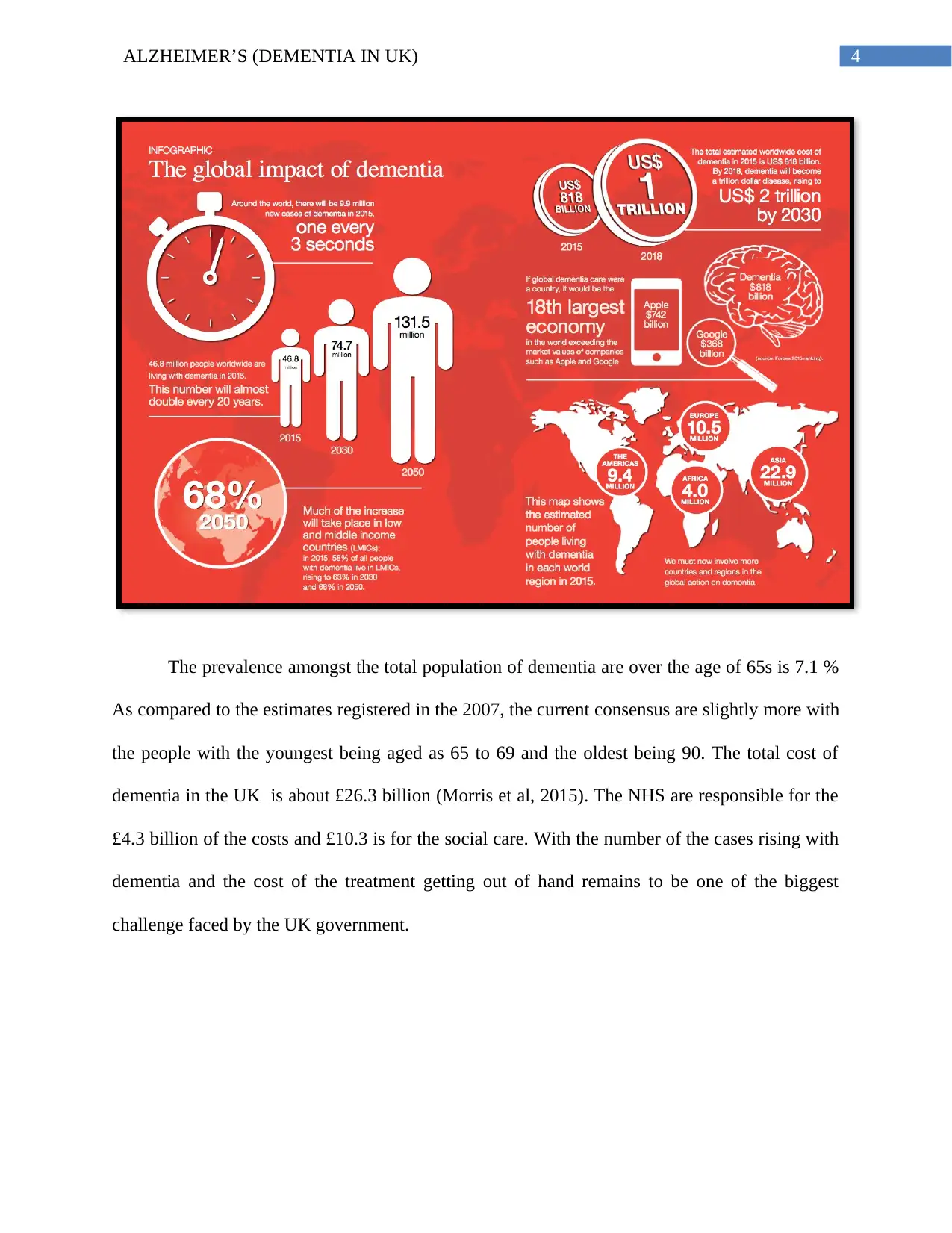
4ALZHEIMER’S (DEMENTIA IN UK)
The prevalence amongst the total population of dementia are over the age of 65s is 7.1 %
As compared to the estimates registered in the 2007, the current consensus are slightly more with
the people with the youngest being aged as 65 to 69 and the oldest being 90. The total cost of
dementia in the UK is about £26.3 billion (Morris et al, 2015). The NHS are responsible for the
£4.3 billion of the costs and £10.3 is for the social care. With the number of the cases rising with
dementia and the cost of the treatment getting out of hand remains to be one of the biggest
challenge faced by the UK government.
The prevalence amongst the total population of dementia are over the age of 65s is 7.1 %
As compared to the estimates registered in the 2007, the current consensus are slightly more with
the people with the youngest being aged as 65 to 69 and the oldest being 90. The total cost of
dementia in the UK is about £26.3 billion (Morris et al, 2015). The NHS are responsible for the
£4.3 billion of the costs and £10.3 is for the social care. With the number of the cases rising with
dementia and the cost of the treatment getting out of hand remains to be one of the biggest
challenge faced by the UK government.
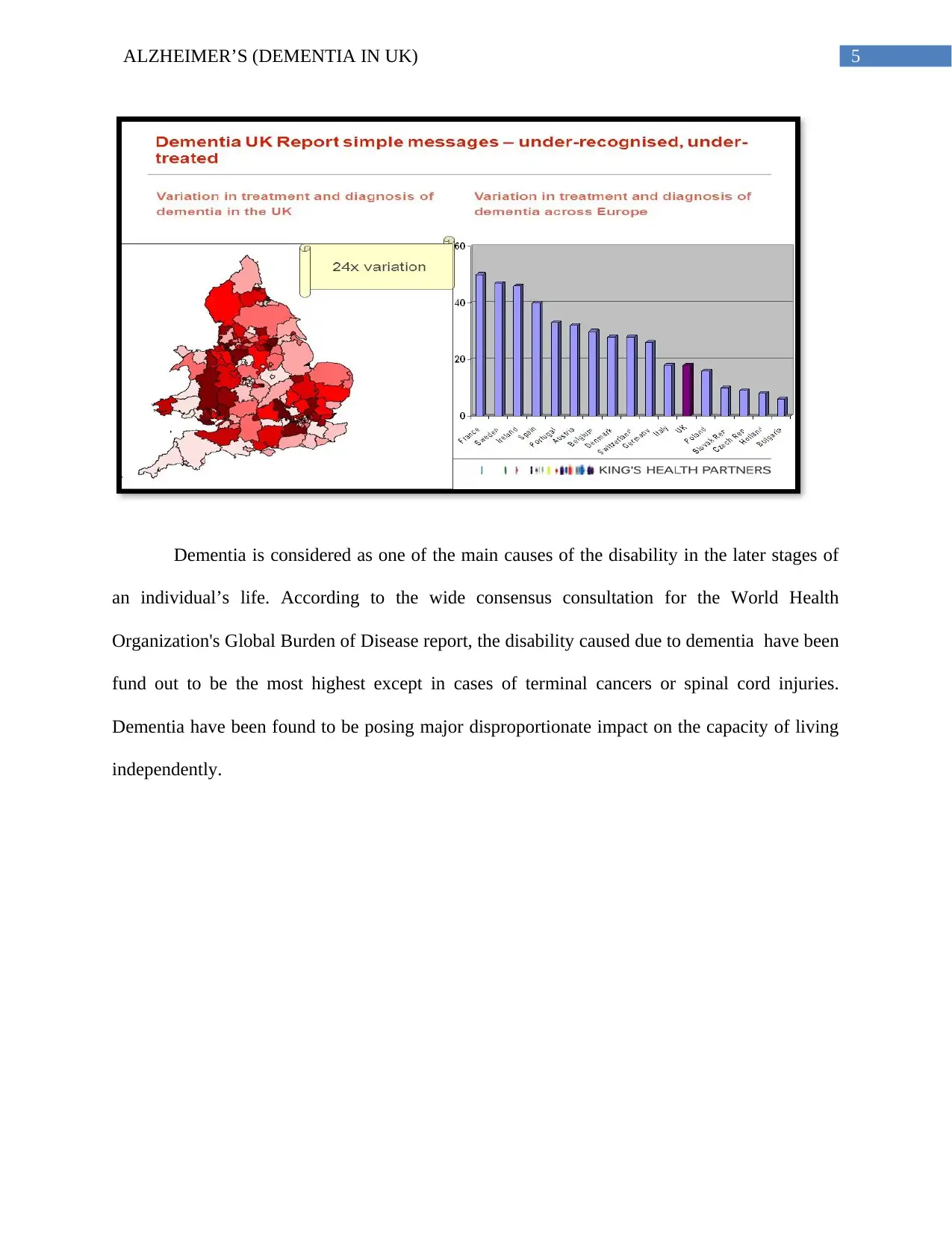
5ALZHEIMER’S (DEMENTIA IN UK)
Dementia is considered as one of the main causes of the disability in the later stages of
an individual’s life. According to the wide consensus consultation for the World Health
Organization's Global Burden of Disease report, the disability caused due to dementia have been
fund out to be the most highest except in cases of terminal cancers or spinal cord injuries.
Dementia have been found to be posing major disproportionate impact on the capacity of living
independently.
Dementia is considered as one of the main causes of the disability in the later stages of
an individual’s life. According to the wide consensus consultation for the World Health
Organization's Global Burden of Disease report, the disability caused due to dementia have been
fund out to be the most highest except in cases of terminal cancers or spinal cord injuries.
Dementia have been found to be posing major disproportionate impact on the capacity of living
independently.
⊘ This is a preview!⊘
Do you want full access?
Subscribe today to unlock all pages.

Trusted by 1+ million students worldwide
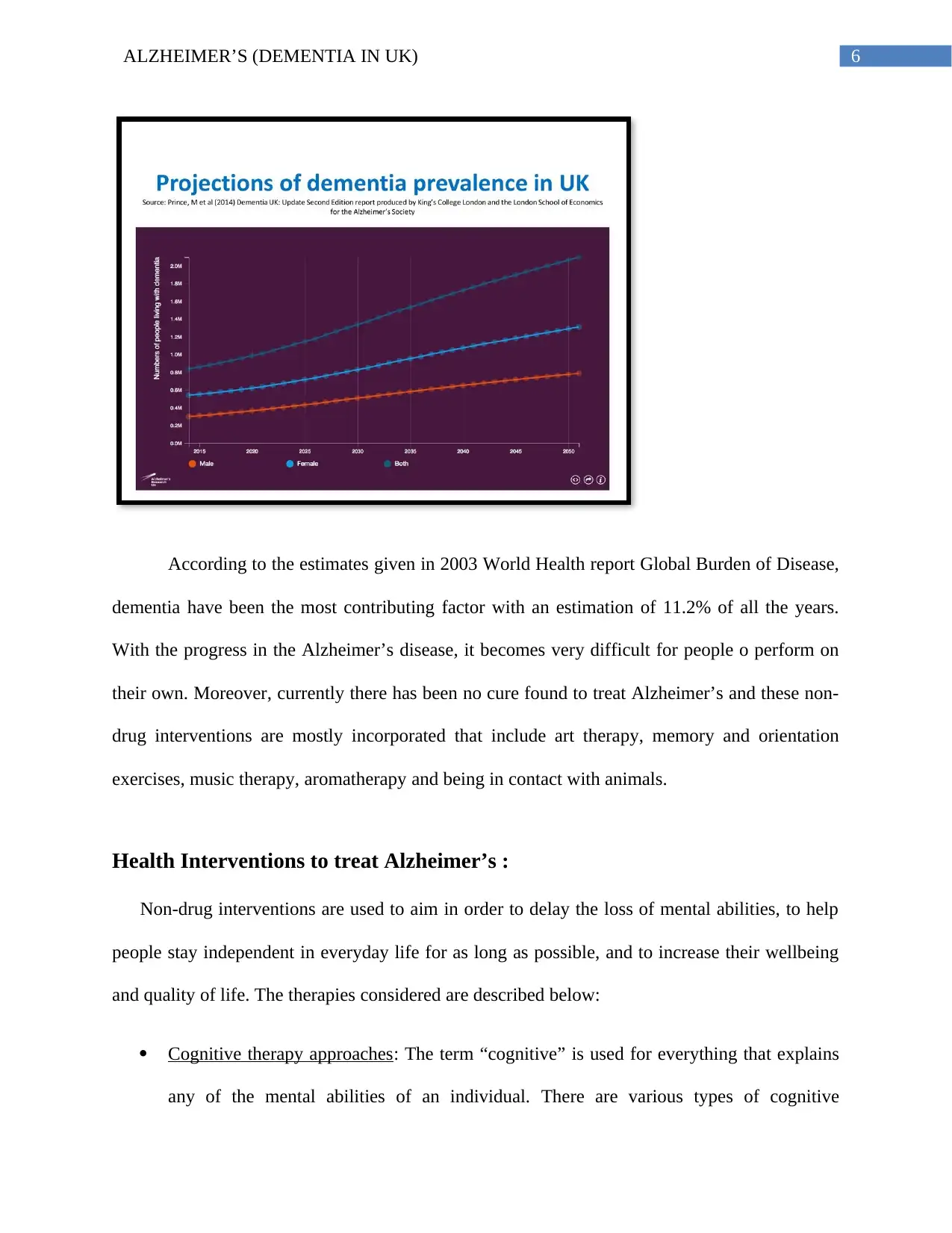
6ALZHEIMER’S (DEMENTIA IN UK)
According to the estimates given in 2003 World Health report Global Burden of Disease,
dementia have been the most contributing factor with an estimation of 11.2% of all the years.
With the progress in the Alzheimer’s disease, it becomes very difficult for people o perform on
their own. Moreover, currently there has been no cure found to treat Alzheimer’s and these non-
drug interventions are mostly incorporated that include art therapy, memory and orientation
exercises, music therapy, aromatherapy and being in contact with animals.
Health Interventions to treat Alzheimer’s :
Non-drug interventions are used to aim in order to delay the loss of mental abilities, to help
people stay independent in everyday life for as long as possible, and to increase their wellbeing
and quality of life. The therapies considered are described below:
Cognitive therapy approaches: The term “cognitive” is used for everything that explains
any of the mental abilities of an individual. There are various types of cognitive
According to the estimates given in 2003 World Health report Global Burden of Disease,
dementia have been the most contributing factor with an estimation of 11.2% of all the years.
With the progress in the Alzheimer’s disease, it becomes very difficult for people o perform on
their own. Moreover, currently there has been no cure found to treat Alzheimer’s and these non-
drug interventions are mostly incorporated that include art therapy, memory and orientation
exercises, music therapy, aromatherapy and being in contact with animals.
Health Interventions to treat Alzheimer’s :
Non-drug interventions are used to aim in order to delay the loss of mental abilities, to help
people stay independent in everyday life for as long as possible, and to increase their wellbeing
and quality of life. The therapies considered are described below:
Cognitive therapy approaches: The term “cognitive” is used for everything that explains
any of the mental abilities of an individual. There are various types of cognitive
Paraphrase This Document
Need a fresh take? Get an instant paraphrase of this document with our AI Paraphraser
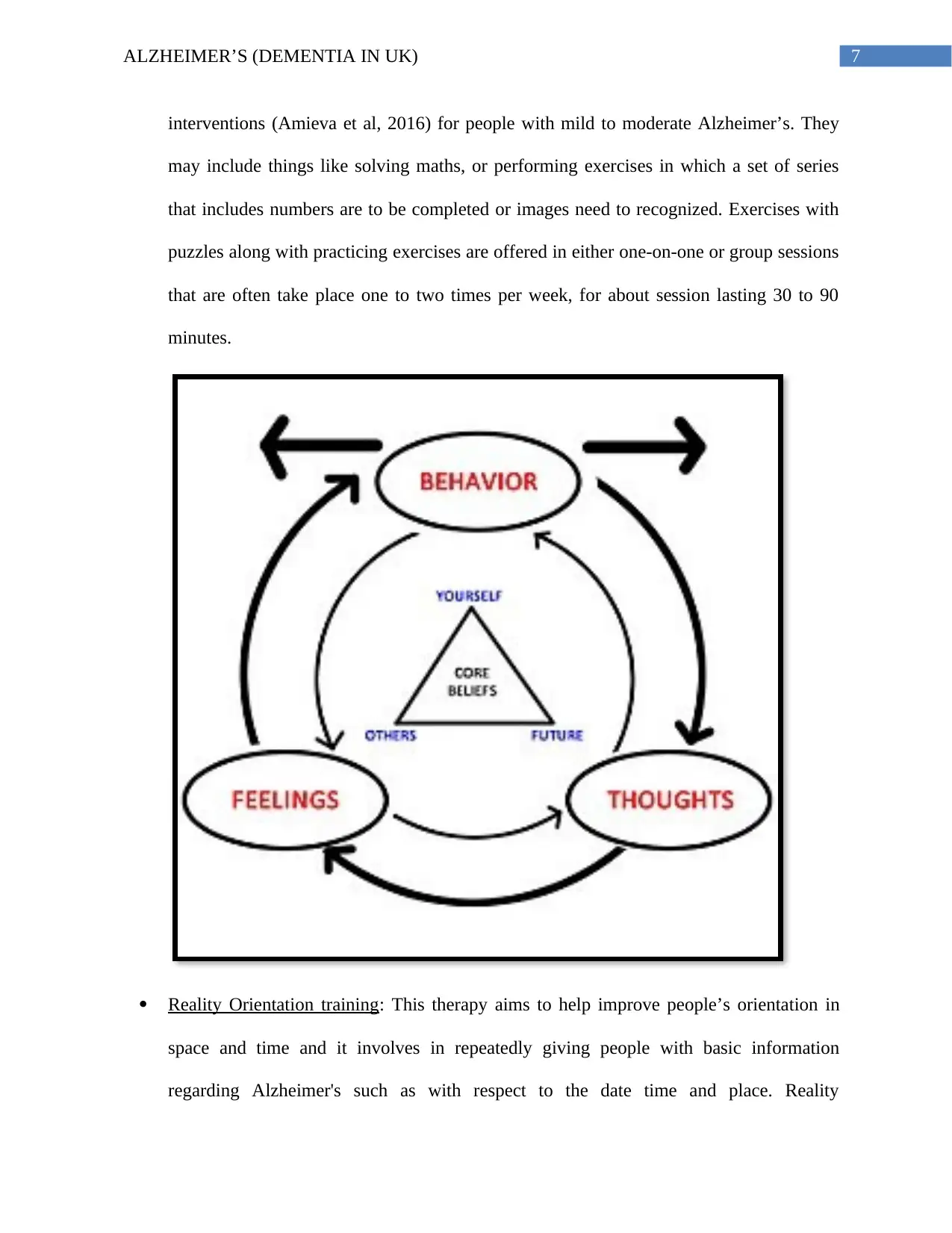
7ALZHEIMER’S (DEMENTIA IN UK)
interventions (Amieva et al, 2016) for people with mild to moderate Alzheimer’s. They
may include things like solving maths, or performing exercises in which a set of series
that includes numbers are to be completed or images need to recognized. Exercises with
puzzles along with practicing exercises are offered in either one-on-one or group sessions
that are often take place one to two times per week, for about session lasting 30 to 90
minutes.
Reality Orientation training: This therapy aims to help improve people’s orientation in
space and time and it involves in repeatedly giving people with basic information
regarding Alzheimer's such as with respect to the date time and place. Reality
interventions (Amieva et al, 2016) for people with mild to moderate Alzheimer’s. They
may include things like solving maths, or performing exercises in which a set of series
that includes numbers are to be completed or images need to recognized. Exercises with
puzzles along with practicing exercises are offered in either one-on-one or group sessions
that are often take place one to two times per week, for about session lasting 30 to 90
minutes.
Reality Orientation training: This therapy aims to help improve people’s orientation in
space and time and it involves in repeatedly giving people with basic information
regarding Alzheimer's such as with respect to the date time and place. Reality
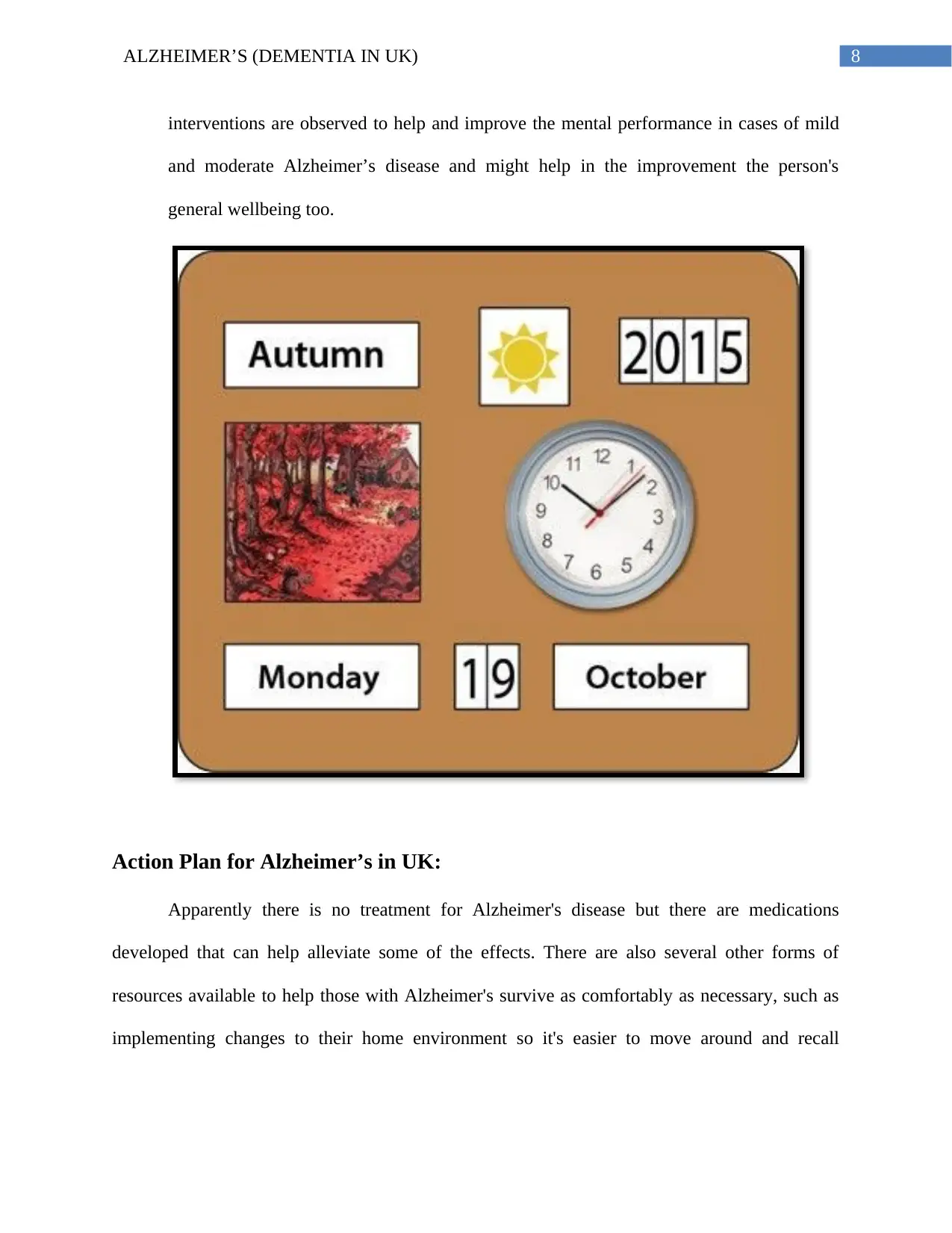
8ALZHEIMER’S (DEMENTIA IN UK)
interventions are observed to help and improve the mental performance in cases of mild
and moderate Alzheimer’s disease and might help in the improvement the person's
general wellbeing too.
Action Plan for Alzheimer’s in UK:
Apparently there is no treatment for Alzheimer's disease but there are medications
developed that can help alleviate some of the effects. There are also several other forms of
resources available to help those with Alzheimer's survive as comfortably as necessary, such as
implementing changes to their home environment so it's easier to move around and recall
interventions are observed to help and improve the mental performance in cases of mild
and moderate Alzheimer’s disease and might help in the improvement the person's
general wellbeing too.
Action Plan for Alzheimer’s in UK:
Apparently there is no treatment for Alzheimer's disease but there are medications
developed that can help alleviate some of the effects. There are also several other forms of
resources available to help those with Alzheimer's survive as comfortably as necessary, such as
implementing changes to their home environment so it's easier to move around and recall
⊘ This is a preview!⊘
Do you want full access?
Subscribe today to unlock all pages.

Trusted by 1+ million students worldwide
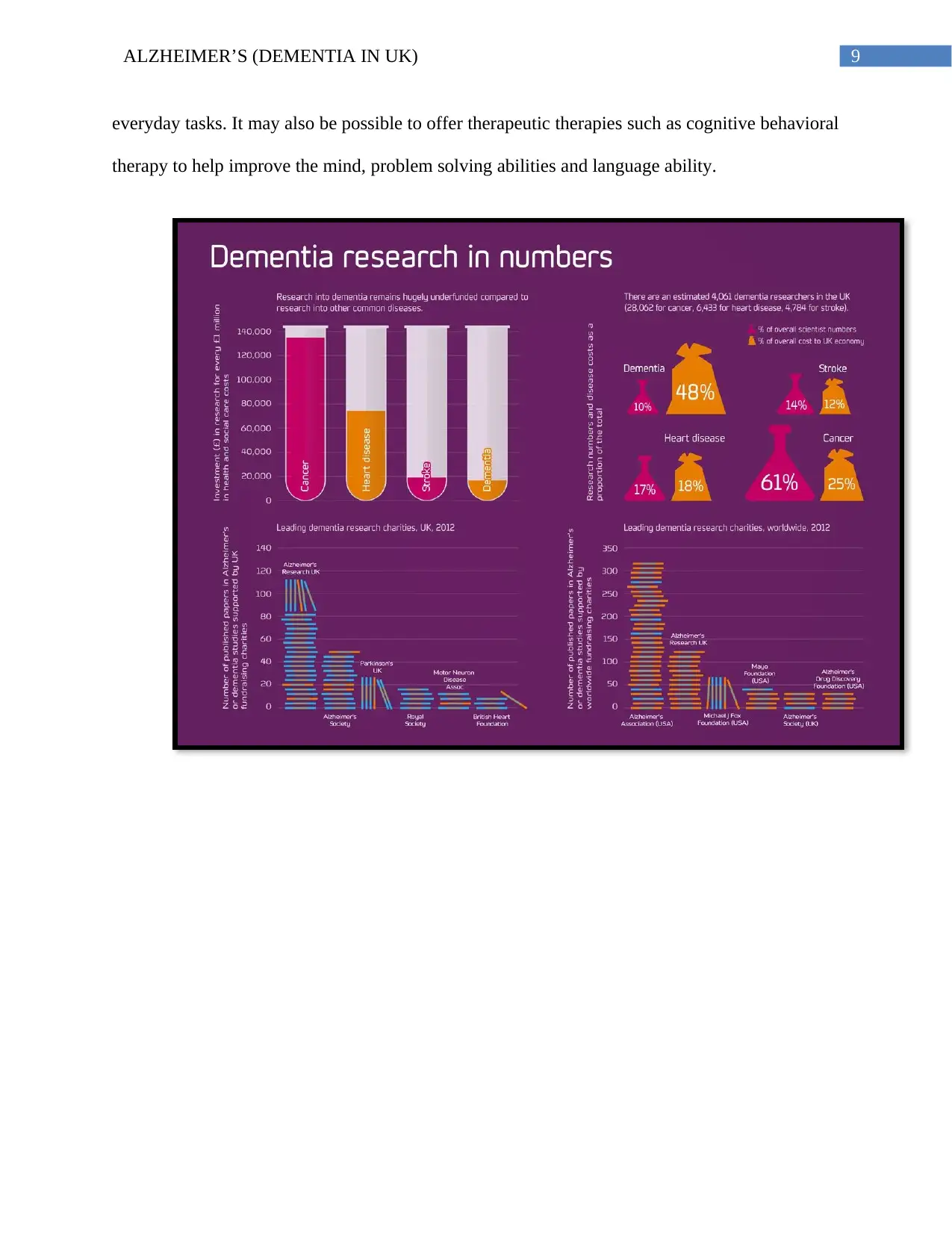
9ALZHEIMER’S (DEMENTIA IN UK)
everyday tasks. It may also be possible to offer therapeutic therapies such as cognitive behavioral
therapy to help improve the mind, problem solving abilities and language ability.
everyday tasks. It may also be possible to offer therapeutic therapies such as cognitive behavioral
therapy to help improve the mind, problem solving abilities and language ability.
Paraphrase This Document
Need a fresh take? Get an instant paraphrase of this document with our AI Paraphraser
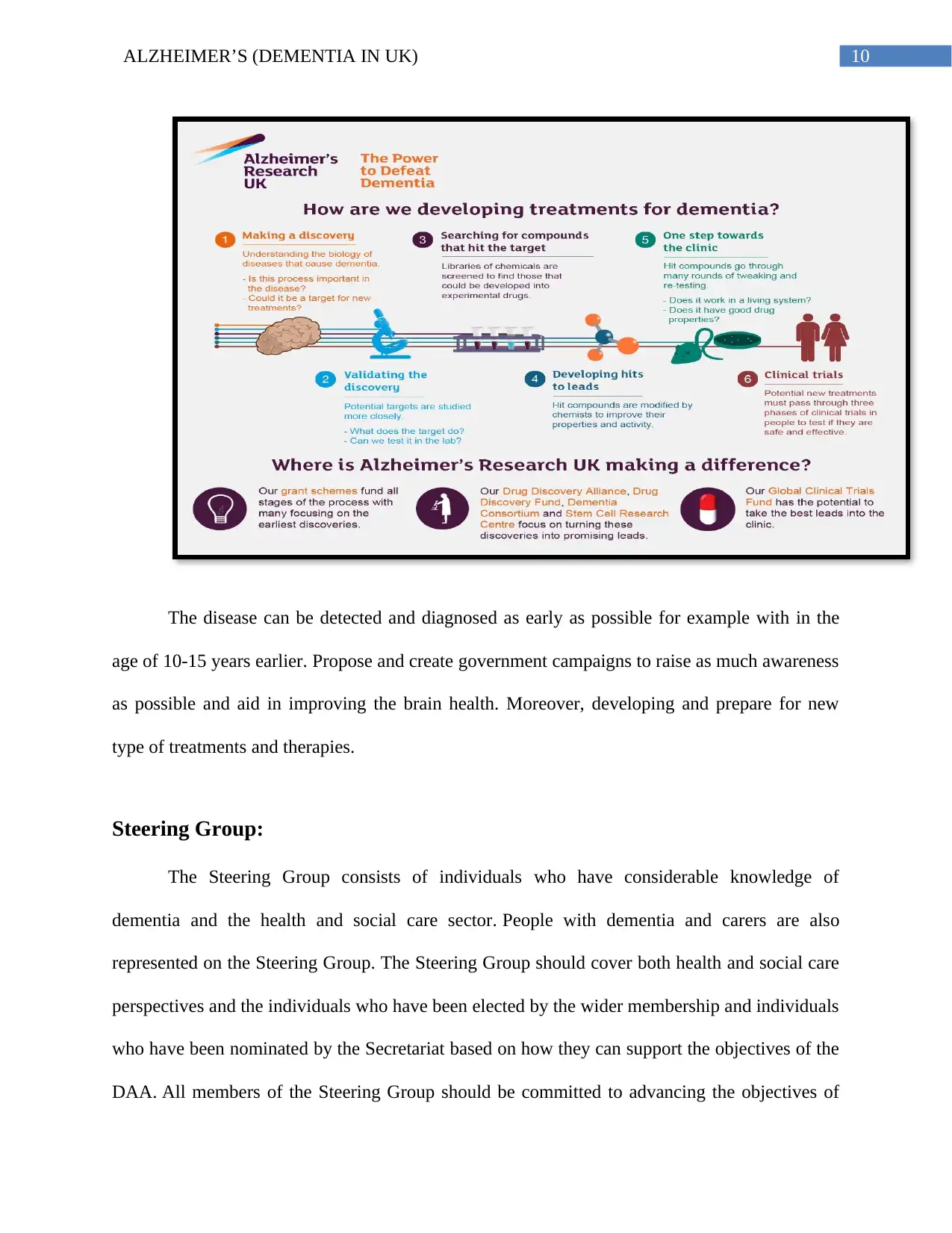
10ALZHEIMER’S (DEMENTIA IN UK)
The disease can be detected and diagnosed as early as possible for example with in the
age of 10-15 years earlier. Propose and create government campaigns to raise as much awareness
as possible and aid in improving the brain health. Moreover, developing and prepare for new
type of treatments and therapies.
Steering Group:
The Steering Group consists of individuals who have considerable knowledge of
dementia and the health and social care sector. People with dementia and carers are also
represented on the Steering Group. The Steering Group should cover both health and social care
perspectives and the individuals who have been elected by the wider membership and individuals
who have been nominated by the Secretariat based on how they can support the objectives of the
DAA. All members of the Steering Group should be committed to advancing the objectives of
The disease can be detected and diagnosed as early as possible for example with in the
age of 10-15 years earlier. Propose and create government campaigns to raise as much awareness
as possible and aid in improving the brain health. Moreover, developing and prepare for new
type of treatments and therapies.
Steering Group:
The Steering Group consists of individuals who have considerable knowledge of
dementia and the health and social care sector. People with dementia and carers are also
represented on the Steering Group. The Steering Group should cover both health and social care
perspectives and the individuals who have been elected by the wider membership and individuals
who have been nominated by the Secretariat based on how they can support the objectives of the
DAA. All members of the Steering Group should be committed to advancing the objectives of
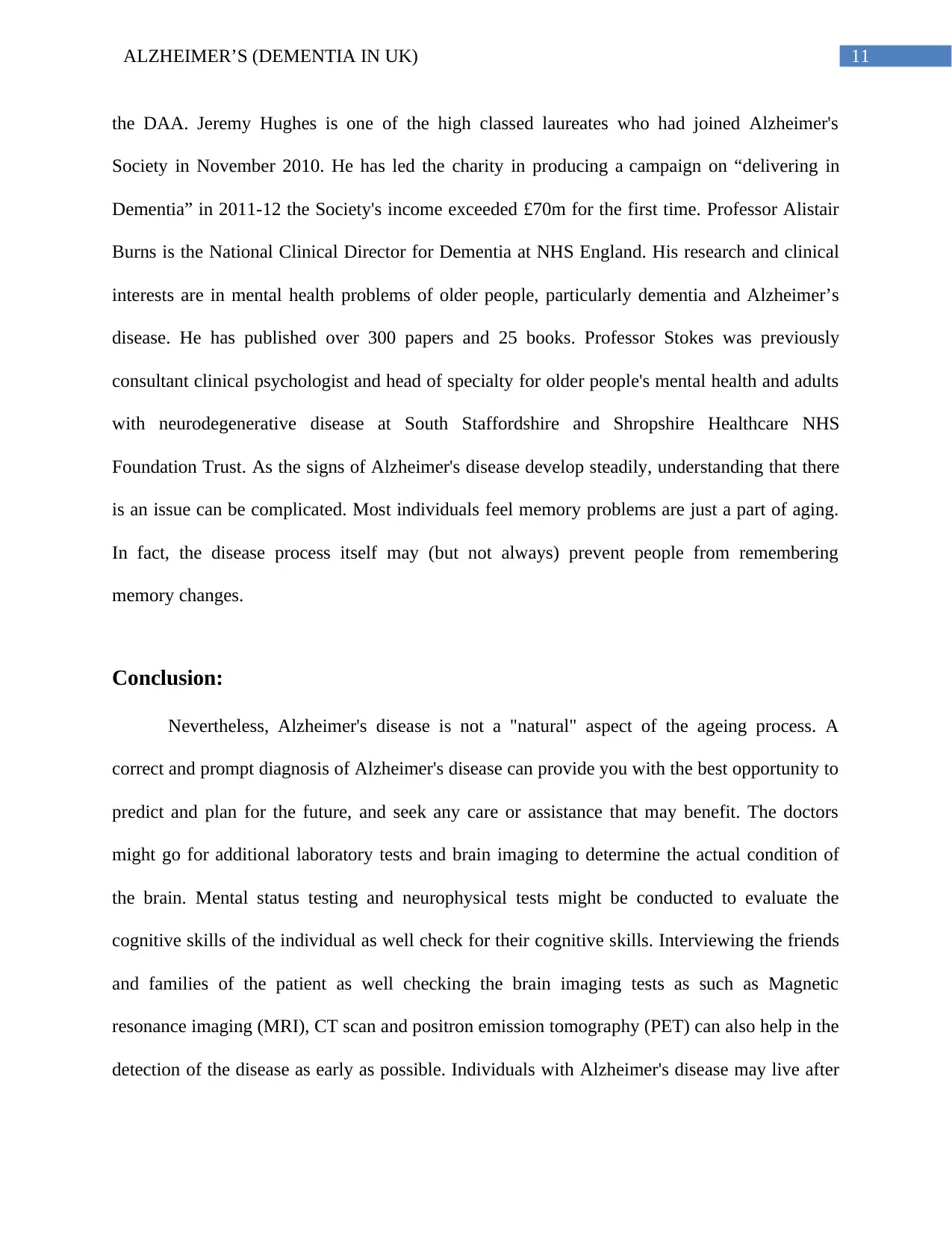
11ALZHEIMER’S (DEMENTIA IN UK)
the DAA. Jeremy Hughes is one of the high classed laureates who had joined Alzheimer's
Society in November 2010. He has led the charity in producing a campaign on “delivering in
Dementia” in 2011-12 the Society's income exceeded £70m for the first time. Professor Alistair
Burns is the National Clinical Director for Dementia at NHS England. His research and clinical
interests are in mental health problems of older people, particularly dementia and Alzheimer’s
disease. He has published over 300 papers and 25 books. Professor Stokes was previously
consultant clinical psychologist and head of specialty for older people's mental health and adults
with neurodegenerative disease at South Staffordshire and Shropshire Healthcare NHS
Foundation Trust. As the signs of Alzheimer's disease develop steadily, understanding that there
is an issue can be complicated. Most individuals feel memory problems are just a part of aging.
In fact, the disease process itself may (but not always) prevent people from remembering
memory changes.
Conclusion:
Nevertheless, Alzheimer's disease is not a "natural" aspect of the ageing process. A
correct and prompt diagnosis of Alzheimer's disease can provide you with the best opportunity to
predict and plan for the future, and seek any care or assistance that may benefit. The doctors
might go for additional laboratory tests and brain imaging to determine the actual condition of
the brain. Mental status testing and neurophysical tests might be conducted to evaluate the
cognitive skills of the individual as well check for their cognitive skills. Interviewing the friends
and families of the patient as well checking the brain imaging tests as such as Magnetic
resonance imaging (MRI), CT scan and positron emission tomography (PET) can also help in the
detection of the disease as early as possible. Individuals with Alzheimer's disease may live after
the DAA. Jeremy Hughes is one of the high classed laureates who had joined Alzheimer's
Society in November 2010. He has led the charity in producing a campaign on “delivering in
Dementia” in 2011-12 the Society's income exceeded £70m for the first time. Professor Alistair
Burns is the National Clinical Director for Dementia at NHS England. His research and clinical
interests are in mental health problems of older people, particularly dementia and Alzheimer’s
disease. He has published over 300 papers and 25 books. Professor Stokes was previously
consultant clinical psychologist and head of specialty for older people's mental health and adults
with neurodegenerative disease at South Staffordshire and Shropshire Healthcare NHS
Foundation Trust. As the signs of Alzheimer's disease develop steadily, understanding that there
is an issue can be complicated. Most individuals feel memory problems are just a part of aging.
In fact, the disease process itself may (but not always) prevent people from remembering
memory changes.
Conclusion:
Nevertheless, Alzheimer's disease is not a "natural" aspect of the ageing process. A
correct and prompt diagnosis of Alzheimer's disease can provide you with the best opportunity to
predict and plan for the future, and seek any care or assistance that may benefit. The doctors
might go for additional laboratory tests and brain imaging to determine the actual condition of
the brain. Mental status testing and neurophysical tests might be conducted to evaluate the
cognitive skills of the individual as well check for their cognitive skills. Interviewing the friends
and families of the patient as well checking the brain imaging tests as such as Magnetic
resonance imaging (MRI), CT scan and positron emission tomography (PET) can also help in the
detection of the disease as early as possible. Individuals with Alzheimer's disease may live after
⊘ This is a preview!⊘
Do you want full access?
Subscribe today to unlock all pages.

Trusted by 1+ million students worldwide
1 out of 16
Related Documents
Your All-in-One AI-Powered Toolkit for Academic Success.
+13062052269
info@desklib.com
Available 24*7 on WhatsApp / Email
![[object Object]](/_next/static/media/star-bottom.7253800d.svg)
Unlock your academic potential
Copyright © 2020–2026 A2Z Services. All Rights Reserved. Developed and managed by ZUCOL.





